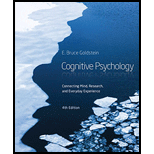
Introduction
Inference refers to interpreting the meaning of a sentence or text by going beyond what is given and by using one's own knowledge and prior experiences.
Explanation of Solution
Answer and explanation
Bransford and Johnson (1973) conducted a study to demonstrate inference in language. In this experiment, the participants were instructed to read certain passages and their memory of what the passage contained was then tested. One of the passages was about an individual named John. It described how he was trying to fix a birdhouse and how his father came to assist him. Bransford and Johnson found that after reading the passage, the participants often responded that John used a hammer to fix the birdhouse, even though it was never explicitly mentioned in the text.
Thus, this experiment showed how people extract information from the text and use their own understanding and knowledge to draw inferences. Therefore, this study provides evidence for instrumental inference, which refers to making inferences about the methods or tools in a text from the given information and one's general knowledge about the world.
Want to see more full solutions like this?
Chapter 11 Solutions
Cognitive Psychology: Connecting Mind, Research and Everyday Experience (MindTap Course List)
- Helllo , according to this topic:Differential Reinforcement, DRA, Create a theise statement?arrow_forwardHhow can social media can facilitate bullying and harassment, which can have severe emotional and psychological consequences for victims.arrow_forwardhow do social media platforms often dictate trends in fashion, music, and lifestyle, significantly shaping consumer behavior.arrow_forward
- Can users often present idealized versions of themselves, which can lead to unrealistic comparisons and impact self-esteem?arrow_forwardCan excessive use of social media has been linked to increased levels of anxiety, depression, and loneliness, particularly among younger users?arrow_forwardHow exposure to diverse cultures and ideas broadens one's perspective of the world, yet it can also result in cultural appropriation or homogeneity?arrow_forward
- How to develop a proposal outline with examples on How Social Media Influences Human Behavior.arrow_forwardWhile reading this article can you explain strong point , weaknesses point an future study https://doi.org/10.1126/science.1182238arrow_forwardWhat are your thoughts of this article https://doi.org/10.1126/science.1182238arrow_forward
- While readings this article what does this explain about the people https://doi.org/10.1126/science.1182238arrow_forwardMake a graph based on this data below : based on group A and Group B Group A (Bilingual): Vocabulary Task Response Times (seconds): [1.1, 1.3, 1.2, 1.0, 1.4, 1.3, 1.2, 1.1, 1.0, 1.2] Sentence Construction Task Response Times (seconds): [2.0, 2.1, 1.9, 1.8, 2.2, 2.1, 1.7, 2.0, 1.8, 1.9] Group B (Monolingual): Vocabulary Task Response Times (seconds): [1.5, 1.6, 1.5, 1.4, 1.7, 1.5, 1.8, 1.6, 1.5, 1.6] Sentence Construction Task Response Times (seconds): [2.5, 2.6, 2.5, 2.7, 2.4, 2.6, 2.7, 2.5, 2.5, 2.6] 2. Outcome of the Experiment The outcome showed that bilingual individuals performed better, with faster response times in both vocabulary retrieval and sentence construction tasks compared to monolingual individuals. 3. Descriptive Statistics Group A (Bilingual): Vocabulary Task: Mean: Mean=10(1.1+1.3+1.2+1.0+1.4+1.3+1.2+1.1+1.0+1.2)=1.21s Standard Deviation (SD): SD≈0.11s Sentence Construction Task: Mean: Mean=10(2.0+2.1+1.9+1.8+2.2+2.1+1.7+2.0+1.8+1.9)=1.99s SD:…arrow_forwardIn this article, can you explain each of the three games ultimatum game, the dictator game, and the party punishment game? Also, how many days did they play the game, and did people know about it? https://doi.org/10.1126/science.1182238arrow_forward
 Ciccarelli: Psychology_5 (5th Edition)PsychologyISBN:9780134477961Author:Saundra K. Ciccarelli, J. Noland WhitePublisher:PEARSON
Ciccarelli: Psychology_5 (5th Edition)PsychologyISBN:9780134477961Author:Saundra K. Ciccarelli, J. Noland WhitePublisher:PEARSON Cognitive PsychologyPsychologyISBN:9781337408271Author:Goldstein, E. Bruce.Publisher:Cengage Learning,
Cognitive PsychologyPsychologyISBN:9781337408271Author:Goldstein, E. Bruce.Publisher:Cengage Learning, Introduction to Psychology: Gateways to Mind and ...PsychologyISBN:9781337565691Author:Dennis Coon, John O. Mitterer, Tanya S. MartiniPublisher:Cengage Learning
Introduction to Psychology: Gateways to Mind and ...PsychologyISBN:9781337565691Author:Dennis Coon, John O. Mitterer, Tanya S. MartiniPublisher:Cengage Learning Psychology in Your Life (Second Edition)PsychologyISBN:9780393265156Author:Sarah Grison, Michael GazzanigaPublisher:W. W. Norton & Company
Psychology in Your Life (Second Edition)PsychologyISBN:9780393265156Author:Sarah Grison, Michael GazzanigaPublisher:W. W. Norton & Company Cognitive Psychology: Connecting Mind, Research a...PsychologyISBN:9781285763880Author:E. Bruce GoldsteinPublisher:Cengage Learning
Cognitive Psychology: Connecting Mind, Research a...PsychologyISBN:9781285763880Author:E. Bruce GoldsteinPublisher:Cengage Learning Theories of Personality (MindTap Course List)PsychologyISBN:9781305652958Author:Duane P. Schultz, Sydney Ellen SchultzPublisher:Cengage Learning
Theories of Personality (MindTap Course List)PsychologyISBN:9781305652958Author:Duane P. Schultz, Sydney Ellen SchultzPublisher:Cengage Learning





